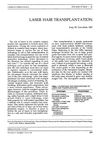16 citations,
April 2020 in “Dermatology practical & conceptual” Laser treatment can effectively reduce unwanted hair growth, particularly for people with fair skin and dark hair.
 40 citations,
February 2012 in “Dermatology Online Journal”
40 citations,
February 2012 in “Dermatology Online Journal” Lasers might help hair growth in some alopecia cases, but more research is needed to confirm their effectiveness and safety.
 14 citations,
May 2011 in “Facial Plastic Surgery Clinics of North America”
14 citations,
May 2011 in “Facial Plastic Surgery Clinics of North America” Laser hair removal is effective for dark hair but needs improvement for nonpigmented or fine hairs.
 1 citations,
January 2009 in “Elsevier eBooks”
1 citations,
January 2009 in “Elsevier eBooks” Combining proper shaving, topical treatments, and laser therapy effectively reduces Pseudofolliculitis Barbae.
 22 citations,
June 2002 in “Seminars in cutaneous medicine and surgery”
22 citations,
June 2002 in “Seminars in cutaneous medicine and surgery” Laser hair removal works well for people with dark hair and light skin, but it's less effective for light hair or dark skin; improvements are expected.
 150 citations,
April 1999 in “Dermatologic Clinics”
150 citations,
April 1999 in “Dermatologic Clinics” Laser hair removal effectiveness depends on targeting hair structures without harming the skin, and improvements require more research and expert collaboration.
 19 citations,
May 2007 in “Dermatologic therapy”
19 citations,
May 2007 in “Dermatologic therapy” The document concludes that various treatments, including laser therapy, are effective for managing pseudofolliculitis barbae, especially in darker skin types.
 4 citations,
January 2011 in “Current problems in dermatology”
4 citations,
January 2011 in “Current problems in dermatology” At-home laser and light devices can safely reduce acne and hair growth when used correctly but are less effective than professional treatments.
 15 citations,
May 2015 in “Photomedicine and Laser Surgery”
15 citations,
May 2015 in “Photomedicine and Laser Surgery” Low-Level Laser Therapy may help with flap survival and burn scar healing, but not with venous ulcers or hair loss, and more research is needed.
 27 citations,
December 2001 in “Clinical and experimental dermatology”
27 citations,
December 2001 in “Clinical and experimental dermatology” Different hair removal methods have pros and cons, and more evidence is needed to prove laser treatments work.
 101 citations,
June 2005 in “Journal of The American Academy of Dermatology”
101 citations,
June 2005 in “Journal of The American Academy of Dermatology” Very few people experience increased hair growth after laser hair removal, especially those with darker skin and black hair.
 60 citations,
December 2015 in “Lasers in Medical Science”
60 citations,
December 2015 in “Lasers in Medical Science” Low-level laser therapy is safe and can increase hair growth for male and female pattern hair loss.
 9 citations,
May 2005 in “Facial plastic surgery”
9 citations,
May 2005 in “Facial plastic surgery” Laser hair removal can be safe and effective for dark-skinned individuals with the right laser settings.
27 citations,
July 2013 in “The journal of investigative dermatology/Journal of investigative dermatology” Lasers have become precise tools in skin treatment and diagnosis, with ongoing advancements improving their effectiveness.
 207 citations,
January 2011 in “Dermatologic Therapy”
207 citations,
January 2011 in “Dermatologic Therapy” Laser hair removal is the most requested cosmetic procedure and has become a scientifically-based treatment suitable for all skin types.
 73 citations,
April 1999 in “Dermatologic Clinics”
73 citations,
April 1999 in “Dermatologic Clinics” Lasers and light sources can effectively remove hair, work best on fair skin with dark hair, and usually need multiple treatments.
 9 citations,
March 2005 in “Aesthetic surgery journal”
9 citations,
March 2005 in “Aesthetic surgery journal” The long-pulse alexandrite laser effectively removes hair permanently.
 10 citations,
July 1997 in “Dermatologic Clinics”
10 citations,
July 1997 in “Dermatologic Clinics” Laser hair transplantation can be effective but should be limited to small areas and requires more training to ensure safety and effectiveness.
 July 2002 in “Dermatologic Surgery”
July 2002 in “Dermatologic Surgery” Some people's hair turned white or gray after using intense pulsed light for hair removal, and for some, it was permanent.
 January 1998 in “Lasers in Surgery and Medicine”
January 1998 in “Lasers in Surgery and Medicine” Lasers are effective and safe for various medical treatments, including cancer, wound healing, and skin conditions.
 32 citations,
January 2010 in “Dermatology”
32 citations,
January 2010 in “Dermatology” Combining laser hair removal with topical eflornithine is recommended for better results in treating unwanted facial hair.
 December 2008 in “The American Journal of Cosmetic Surgery”
December 2008 in “The American Journal of Cosmetic Surgery” Multi-pass laser skin treatments improved healing, reduced pain, and had no major complications.
 31 citations,
April 1999 in “Dermatologic Clinics”
31 citations,
April 1999 in “Dermatologic Clinics” Nd:YAG laser can reduce hair with multiple treatments, but permanent removal isn't guaranteed.
 147 citations,
January 2014 in “American Journal of Clinical Dermatology”
147 citations,
January 2014 in “American Journal of Clinical Dermatology” Laser device increases hair density, safe for treating hair loss in men and women.
 22 citations,
September 2014 in “Veterinary Dermatology”
22 citations,
September 2014 in “Veterinary Dermatology” Low-level laser therapy seems to help dogs with noninflammatory alopecia grow hair back.
 23 citations,
December 2001 in “Lasers in Surgery and Medicine”
23 citations,
December 2001 in “Lasers in Surgery and Medicine” Permanent hair removal is hard, but using longer laser pulses at lower power might improve results.
 7 citations,
March 2016 in “Journal of Cosmetic and Laser Therapy”
7 citations,
March 2016 in “Journal of Cosmetic and Laser Therapy” Home-use lasers and IPL devices are unlikely to directly cause paradoxical hair growth; it may be linked to inflammation or hormonal issues.
 January 2024 in “Photodiagnosis and Photodynamic Therapy”
January 2024 in “Photodiagnosis and Photodynamic Therapy” Using minoxidil with laser therapy is more effective for female hair loss than minoxidil alone.
 1 citations,
January 2021 in “Journal of Dermatology and Dermatologic Surgery”
1 citations,
January 2021 in “Journal of Dermatology and Dermatologic Surgery” Taking Vitamin D supplements may increase the risk of skin darkening after laser hair removal.
 19 citations,
July 2006 in “Lasers in medical science”
19 citations,
July 2006 in “Lasers in medical science” Laser hair removal is safe and effective for fair-skinned people with dark hair, and using eflornithine with laser treatments can improve results.



























